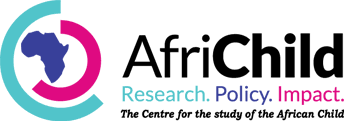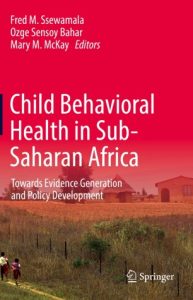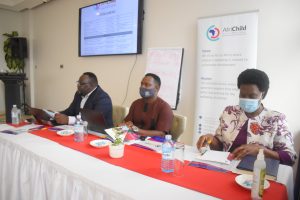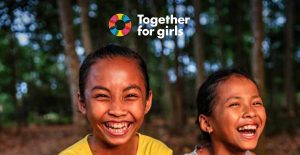Ugandan fathers have been tasked with being accountable to their parental obligations by primarily being actively present in the lives of their own children and families. The call was made during the launch of the State of Uganda’s Fathers Report oragnised by the AfriChild Centre.

‘They [fathers] must inspire and create minimum standards for a family to thrive,’ said the gender ministry’s permanent secretary, Aggrey David Kibenge.
‘And a good family produces a good state. Good families produce good statesmen and patriots or servants of the Lord and the state.’
His remarks were delivered during the scientific launch of a first ever report on the state of Uganda’s fathers on Tuesday at Makerere University, as part of activities to commemorate this year’s Father’s Day.
The launch of The State of Uganda’s Fathers Report, 2021 was hybrid in nature, with both a physical and mostly virtual attendance.
Chief guest Kibenge, who was away engaged in other official duties, was represented by Bernard Mujuni, the commissioner in charge of equity and rights at the gender ministry.
The report was produced by AfriChild Centre, a child-focused research facility based at Makerere University. It is a product of a scoping review conducted over a period of one year, led by Dr. Firminus Mugumya, a senior lecturer at Makerere University. Also involved in the study was Promundo, a global organisation that promotes gender justice.
The report was themed: Hightlighting the significance of fathers’ active contribution to child wellbeing.
‘The theme for the launch impels us to audit ourselves as fathers in as far as our active participation or inaction is concerned in ensuring the wellbeing of our children,’ said Kibenge (through his delegate Mujuni).
‘On a day like this, it is important to remind ourselves about the meaning of the title father. Fathers are supposed to be the foundation of strength (protection), hope, assurance, love, providers for the family, passion, compassion.’
‘A divine and sacred responsibility’
The chief guest was also keen to lend spiritual context to the father role.
‘The vital importance of a father comes from the fact that, with his wife, he co-operates with God, the Creator, in bringing a new human being into this world. And this new life must be nurtured through co-operation, love and care [in order] for humanity to continue,’ said Kibenge.
‘Fatherhood is exalted as the greatest vocation for a man.
‘In the Bible – Book of Matthew – Jesus denounces those who simply desire to be titled father as a form of honour before men, but without applying themselves to honour and represent the Holy Father. This means that fatherhood is a divine and sacred responsibility. It must be treated as such, therefore.
Another speaker that lent biblical allusions to Tuesday’s discussion was Stephen Langa, the executive director of Family Life Network.
Making reference to the last verse of the Old Testament, the renowned counsellor said: ‘If fathers do not play their roles, there is no way society will be able to thrive.’
‘National crisis’
In the parenting context, Langa boldly thrust Uganda’s current situation into a spotlight the spelled gloom and doom.
‘When fathers fail, then everybody, the whole society, fails. What is happening now is not a good thing as far as families are concerned. We are in a national crisis.’
And why does he call it a crisis?
He chanced on a ‘brief informal survey’ conducted about a decade ago ‘by a certain group around Kampala’. The study found that:
– 10% of fathers in Uganda have fathered a child, but are not even aware
– 40% of men have fathered a child and have abandoned them
– 45% are fathers who look after their children – but do not connect emotionally with them
– 5% of men provide for their children and connect with them emotionally
‘What this means is that we are a fatherless nation,’ said Langa. ‘And what we see around us actually reflects that.’
But not all is lost, he added, striking a tone of optimism.
‘The good news is that men can be sensitized and can be trained to be responsible fathers.’
‘It is not all lost. It is not too late. Something can be done. This matter of fatherhood should be treated as a national emergency.
‘Stable families bring out the best outcome for men, women and children.’
The report
The whole idea behind the research was to build on previous related work to inform policymakers, researchers and practitioners on men’s involvement in direct child care work.
‘We were also looking to highlight opportunities for improving research knowledge with policy and recommendations – looking at fatherhood as an entry point for improved social outcomes for children and families in general,’ said Clare Ahabwe Bangirana, the director of research at AfriChild Centre.
The researchers went for a scoping review approach.
Basing on an initial literature review, they agreed that ‘there is not much that has been done on fatherhood and fathers’ involvement in Uganda’, according to Bangirana.
Out of 145 studies done on fatherhood around the world, Bangirana and her diverse team closed in on 16, which were specific to Uganda. An additional 58 from the original 145 were considered to provide insights.
A dozen (12) of the 16 studies zeroed on were undertaken with fathers in central Uganda, one with fathers in Karamoja and three in northern Uganda.
The findings
Dr. Firminus Mugumya, a senior lecturer in the Departmant of Social Work and Social Administration at Makerere University, led the team.
He said that while scoping reviews are not a common methodology, as they are not believed to be rigorous enough, they are still useful.
Also a research associate with AfriChild, Mugumya listed the four questions they pursued in their study as being:
– What does fatherhood and being a father mean in Uganda?
– What do Ugandan fathers perceive their roles to be?
– How do fathers perceive and describe the concept of father involvement, especially in child care?
– How do the existing policies, frameworks and programmes frame father involvement?
The study found out that fathers in Uganda are male parents of both biological and non-biological children, That is, biological fathers (the majority) and social fathers.
From a cultural and relational angle, the latter group (social fathers) were found to be as significant in the lives of the children – and they include uncles, male partners of mothers of children from past relationships, males in cohabiting situations as well as single fathers.
The team also found that a father was considered as ‘a transition to adulthood’, according to Mugumya. Most studies targetted married fathers and only one focused on single fathers.
‘On perception, the fathers and the community looked at fathers to be mainly supposed to be undertaking tasks that are so demanding physically, economically or cognitively as opposed to what the mothers should be doing,’ revealed the lead researcher.
‘This really communicates a gap.’
He added: ‘We found out that the majority of the men – if not all – who are uninvolved, especially in caring for children, were those that were more inclined towards the cultural norms that presented a clear difference in terms of division of labour between men or fathers and mothers.’
Education and wealth key
Literature provided the researchers with three categories of roles that fathers play:
– Provision of basic needs
– Ensuring safety and emotional support
– Nurturing (morals, discipline, etc)
Aside from social norms, the team found that education and wealth are key in influencing the extent to which fathers get involved in caregiving.
‘The more educated people and the fairly wealthy people were largely involved and they were able to challenge the stereotypes regarding who should care for the children,’ said Mugumya.
Among the contextual factors, single fatherhood presented the difficulty a parent went through to support his child.
At the institutional level, the researchers were drawn to the sticky issues around maternity and paternity.
‘The policies give limited time in terms of paternity for the fathers to be able to involved in the care, especially after birth,’ said Mugumya.
The health environments, especially at the health facilities level, were highlighted not to be supportive or friendly in terms of males or fathers effectively being part of the caregiving processes.
A claret call for more research on fatherhood
One limitation of the study is that, being a scoping review, there is no primary data, said Godfey Siu, a lecturer at the Child Health & Development Centre at Makerere University.
He was part of the core team that conducted the research.
Another downside is the lack of quantitative data. ‘However, that is also where opportunities lie at the moment for future work.’
Siu said that research on the role of negative social norms around masculinity and fatherhood has not been highlighted clearly.
‘As people involved in this area, we now know that social norms are important in shaping fatherhood. So we need more research in this area.’
He said that although there are programmes being carried out around Uganda on men involvement, ‘we do not really know clearly from the studies that have been conducted about the impact of these programmes as well as policies’.
As such, there has yet to be clarity on the specific roles of fathers, added Siu.
‘Fathers who wish to be involved may sometimes find that they are systematically excluded due to the absence of policies.’ Citing some contradictions, Siu said they also established a ‘disconnect between laws and the definitions and roles that fathers play (societal definitions).
‘Timely report’
Meanwhile, AfriChild executive director Timothy Opobo said theirs is work geared towards ‘shaping attitudes and behaviour that ultimately impact on the positive wellbeing of our children’.
Only a week ago, AfriChild launched a report on the effect of the COVID-19 pandemic on the wellbeing of children in Uganda.
Opobo said the launch of the report on fathers is also ‘timely’ and comes ‘at a time when families are locked down at home. And from the previous experiences we did see, there was a lot of disturbance in households during the lockdown’.
‘And fathers, being the cornerstone of the household, are therefore very pertinent in the wellbeing of families, communities, and children.’
So what should be done?
‘There is need to address the evidence gap by conducting more national-focused studies with different categories of fathers to generate evidence on aspects of fatherhood,’ said Siu.
The report authors also feel that the exisiting policies need to be harmonised.
‘We did not find many programmes that are specifically addressing fatherhood. So we suggest very strongly that there is need to consider designing and implementing programmes and campaigns that recognize and prioritize redistribution of care work equally between men and women, and boys and girls.’
More importantly, the team feels there is need to promote the ethics of male caregiving – starting from the schools – to enage with ‘future fathers’.






